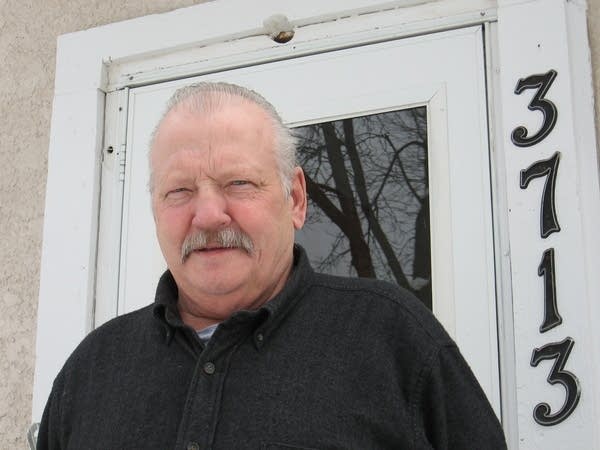Foreclosure spike may mean new consumer protection laws in Minnesota

Joe Ripplinger, 66, sits at the dining room table of his south Minneapolis home, a house that's been a source of anxiety since he signed the first of three mortgage refinances.
Ripplinger says he responded to the initial offer four years ago following an injury that left him unemployed and living on Social Security benefits with a stack of unpaid medical bills.
"I was getting calls from -- what do you call them people -- loan officers or loan sharks?" Ripplinger recalls. "Anyway, then I says, well OK, I don't have money. And they said, well, you can refinance your house and pay off doctor bills and all of the bills. And I said well, that sounds good. But then one thing happened after another and after a while it just got worse."
Ripplinger now owes $187,000 on the house he paid $25,000 for in the 1970's. Ripplinger says the same broker handled his last two refinances which were done within months of each other last year.
Create a More Connected Minnesota
MPR News is your trusted resource for the news you need. With your support, MPR News brings accessible, courageous journalism and authentic conversation to everyone - free of paywalls and barriers. Your gift makes a difference.
"What they're doing is looking out for their own interests to make big profits for themselves and this is not right. And this is where people are starting to lose their homes," Ripplinger says.
Ripplinger now is holding a complicated hybrid mortgage. Even though he's making monthly payments, his balance is increasing. In less than three years he'll owe more than $213,000.
His payment will then dramatically increase to nearly triple what it is now, an amount he can't come close to affording.
When he discovered the details of his new exploding mortgage, Ripplinger says he contacted the broker to rescind the agreement within the legal time period. But he says the company ignored him. He's trying to get out of the mortgage with the help of ACORN, a housing advocacy group and some other brokers.
On the national level the home loan industry is bucking moves in Congress to pass consumer protection legislation. But in Minnesota the mortgage brokers say they're ready to work with lawmakers in hopes of weeding out problem lenders.

"There's a serious problem in Minnesota," says Pat Martyn, the Executive Director of the Minnesota Association of Mortgage Brokers.
"Most of the industry, in all aspects of the real estate transaction, are doing the job correctly," Martyn says. "Most people are well intentioned and trying to do their level best by the consumer. But for those rotten apples that are not doing their best for the consumer, they should be on notice that Minnesota is going to pass additional penalties and we're going to be very aggressive in terms of enforcement in rooting out fraud." Consumer protection proposals that are getting the most attention at the state Capitol grew from the work of a group appointed by Attorney General Lori Swanson to study predatory lending problems in the mortgage industry.
Among the recommendations is a criminal penalty for knowingly selling a mortgage that is grossly unsuitable for a borrower.
"I would like to see brokers having to have a higher obligation to borrowers," says Swanson.

Swanson says she wished legislation weren't necessary, but she says the industry has not policed itself and brokers need to be held accountable.
"Realtors have certain fiduciary obligations. Insurance sales people have a suitability obligation. Securities brokers have fiduciary obligations. Lawyers do as well," Swanson says, "and I would like to see mortgage brokers also have to have an obligation where they are looking out for not just their own commissions, but for the borrower's interests as well."
The Attorney General's legislation would require lenders to verify a borrower's ability to repay a home loan. It would also ban pre-payment penalties and further cap lender fees.

Another proposal at the Capitol would require independent counseling for certain "high-cost" mortgage applicants.
Pat Martyn, from the brokers association, says he welcomes the legislative interest in clamping down on fraud. Martyn says his association even supports the criminal penalty proposal provided it's written in a way that allows for objective measurements.
"On suitability, for example, we fully support the suitability standard if it's crafted correctly," Martyn says. "We have to have a definable measure for us to calculate what actually is suitable and what is not. That should not be guess work. We should have a standard that everybody can identify," says Martyn.
There's concern that tighter regulations might end up hurting the people the legislation is designed to protect by making home ownership more to difficult to quality for.
But Sen. Linda Higgins, DFL-Minneapolis, who's carrying the bill in the Minnesota Senate, says the alternative is far worse. Higgins represents north Minneapolis where an increasing number of for-sale signs and boarded up homes illustrate the foreclosure crisis.
"We really want to protect as many people from getting into foreclosure as possible and,if that means that they don't get that loan in the first place, well some people are just not going to get that loan in the first place," Higgins says.
With the industry, the attorney general and members of the Legislature supporting consumer protection law changes most agree it's not a question a whether there will be a bill, but rather how sharp the teeth will be.
